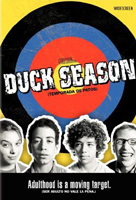 BUY IT AT AMAZON: CLICK HERE!
BUY IT AT AMAZON: CLICK HERE!
STUDIO: Warner Bros.
MSRP: $27.98
RATED: R
RUNNING TIME: 91 Minutes
SPECIAL FEATURES: None.
The Pitch
"It’s
Empire
Records meets Stand By Me! (Minus dead guys and
copy-room sex.)"
The Humans
Enrique
Arreola, Diego Cantaño, Daniel Miranda, Danny Perea.
The Nutshell
Two young
teenagers find themselves home along in their
imbibe industrial-sized quantities of caffeine and play Halo. Their plans are
brought to a sizzling halt when the power goes out. A neighbor girl comes over
to use their gas-powered stove, and a pizza deliveryman shows up and refuses to
leave until the kids pay him. Four bored souls on a summer afternoon. You can
bet your ass that tentative drama ensues, and come away with ass intact.
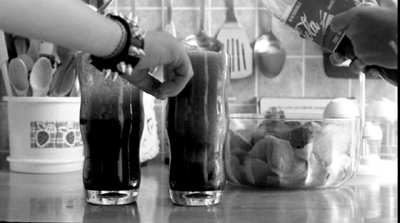
"This far. No farther."
The Lowdown
I don’t
know why people want so often to regress to their childhoods. Okay, that’s a disingenuous
opening line, but stick with me. Childhood is partly the state of being
ignorant. We have these stories that we classify as "coming-of-age,"
because we set great store in innocence being drained away as knowledge and
experience replace it. A longing for childhood isn’t much different from a wish
for irresponsibility. If you don’t know any better, then you can act with
freedom.
Not many
of us have our childhoods taken from us at the point of some dramatic event. For
most of us, it’s a gradual, analog sort of change from youth to young
adulthood. There are those doomed few who were altar boys or had certain uncles
named Jim, and to them I say, with all compassion, Sucks to be you. But, hey,
do you wanna see kinda how it was for the rest of us? In a sort of time-lapse,
as it were. That’s just what Duck Season does: takes a single
afternoon of youth and believably stretches it to represent the entirety of the
childhoods of the four subjects.
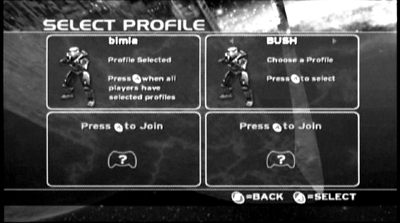
Fanboys are so desperate to see behind Bush’s mask.
I
mentioned Empire Records in the pitch because the structure of Duck
Season contains a lot of similarities in the second act. A team of
misfits assembles at a single location and interact to humorous effect. None of
Duck
Season‘s characters are as broadly drawn as in any similarly-minded
comedy, but at the same time they are roughly the same depth. They’re
intentionally one-dimensional, just points on a line. They move forward, but
the world affects them instead of the other way around.
Though
its progression is familiar, Duck Season‘s humor is all its own. It’s
whimsical in a black and depressing fashion. The whimsy manifests in long
stretches of boredom, of aimlessness which partly galls because, damn it, if I
could have that much time just free, I’d fill it clear the fuck up. The other
lingering smirk of adulthood is that the filmmakers make it obvious that time
is progressing, that these little points are moving along the graph, and this
is possibly the last such afternoon that they’ll have.
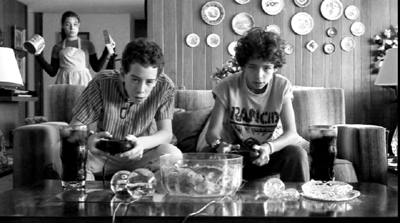
"Coffee? Tea? Me?"
It’s not
a complicated conceit, but it does tend maintain a freshness throughout, partly
because of the performances of the young cast, and partly because director
Fernando Embcke knows how to exploit small spaces. It does have the misfortune
of being concerned entirely with an endless afternoon. As a result, the
challenge facing the filmmakers was how to maintain an energy despite such
intentionally dull material. The momentum bleeds out every so often, and a lot
of this can be blamed on the editing. The filmmakers wanted to create a
sensation of time passing, of cramming a lot of hours into their ninety minute
film. The editor correctly assumed that frequent fades in and out would trick
the audience into accepting (and explicitly noticing) the passage of time. Such
sequences also fool the audience into thinking a new and important event will
soon be forthcoming, and often there isn’t one.
It’s this
issue with pacing that seems to comment best on the film itself. It’s
self-indulgent, but not without purpose. It’s not overly wise when it comes to
the notions of childhood, but it does mirror the mindset. It’s selfish with its
sense of time and with the release of information, which is stylistically
coherent but lacking substance. What it does well is have a playful time with
those parts of childhood from which we tend to take away the lasting
educations, while remaining somber enough to recognize that a lesson learned is
another irrecoverable step further from youth.
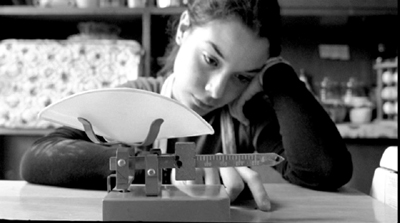
"Shit. More than the weight of a feather. Fuck. Nice to know you all."
The Package
The
production qualities are low-budget, but not obtrusively so. The sound quality
is thin, but without need for richness. The black-and-white video is grainy,
which maintains the (ohgodidon’twanttousethisword) verisimilitude. Basically,
complaining about these qualities would be like complaining about word choice
in the script. They are deliberate choices, worth noting because they tell you
a little something about the film, but as much a part of the whole as the
acting and direction.
No
bonuses. Probably good. Could you stand to watch me bust out another word like
"verisimilitude" with a straight face?
7.3 out of 10